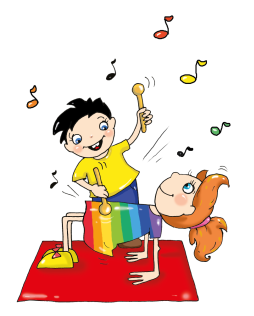
The early years of a person’s life have a huge impact on modelling the adult they become. During this time, building blocks are being assembled that will support further mental, physical and spiritual growth. Regular yoga practice teaches young children to look after their bodies and minds in a gentle and noncompetitive way. This permits the child to learn the discipline at their own pace, an important factor in developing internal motivation. It also encourages them to develop a strong sense of self by focusing on their own capabilities and listening to their inner thoughts and not those of others.
Physically, yoga naturally helps the body become strong and flexible; it helps co-ordination and balance, breath control and concentration. Breathing and relaxation techniques teach the child how to be calm and self-controlled. Positive affirmations, mantras and chanting can help a child learn self love, trust and confidence building upon the important yogic concept of "ahimsa" or "nonviolence to the self and others". These are invaluable life skills that be carried forward into many other situations and environments throughout their lifetime.
Toddler yoga differs from adult yoga in use of songs, story-telling and games. It ticks every EYFS box for learning and development in under 5s identified to ignite curiosity and enthusiasm for learning, to form relationships and to help a child thrive. Class themes are fun and varied and support development of communication and language, literacy, mathematics, understanding of the world and self expression. Toddler yoga also offers a fun way for the accompanying caregiver to bond with their child and also for the child to build social skills by interacting with other young children.
The world now moves at a super fast pace. In order to keep up we need to stay in optimal health. More and more parents, healthcare, education and childcare professionals are realising that practising yoga can provide optimal fitness in the bodies, minds and spirits of a child so that they have the ability to cope with this super fast pace.
Often as a child grows and reaches the teen years, they can drift away from activities they once loved as young children, but yoga builds such a strong foundation in almost every aspect of a child's being that it is almost impossible to escape it in it's entirity. Personally, I often find that even in those extremely busy periods when I have very little time to practise the physical postures (asanas), that I use the yogic philosophies as a crutch for support. As a yoga teacher I am very passionate about sharing this with youngsters, their caregivers and the wider community so why not come along to a class and have a try?
Physically, yoga naturally helps the body become strong and flexible; it helps co-ordination and balance, breath control and concentration. Breathing and relaxation techniques teach the child how to be calm and self-controlled. Positive affirmations, mantras and chanting can help a child learn self love, trust and confidence building upon the important yogic concept of "ahimsa" or "nonviolence to the self and others". These are invaluable life skills that be carried forward into many other situations and environments throughout their lifetime.
Toddler yoga differs from adult yoga in use of songs, story-telling and games. It ticks every EYFS box for learning and development in under 5s identified to ignite curiosity and enthusiasm for learning, to form relationships and to help a child thrive. Class themes are fun and varied and support development of communication and language, literacy, mathematics, understanding of the world and self expression. Toddler yoga also offers a fun way for the accompanying caregiver to bond with their child and also for the child to build social skills by interacting with other young children.
The world now moves at a super fast pace. In order to keep up we need to stay in optimal health. More and more parents, healthcare, education and childcare professionals are realising that practising yoga can provide optimal fitness in the bodies, minds and spirits of a child so that they have the ability to cope with this super fast pace.
Often as a child grows and reaches the teen years, they can drift away from activities they once loved as young children, but yoga builds such a strong foundation in almost every aspect of a child's being that it is almost impossible to escape it in it's entirity. Personally, I often find that even in those extremely busy periods when I have very little time to practise the physical postures (asanas), that I use the yogic philosophies as a crutch for support. As a yoga teacher I am very passionate about sharing this with youngsters, their caregivers and the wider community so why not come along to a class and have a try?
 RSS Feed
RSS Feed
